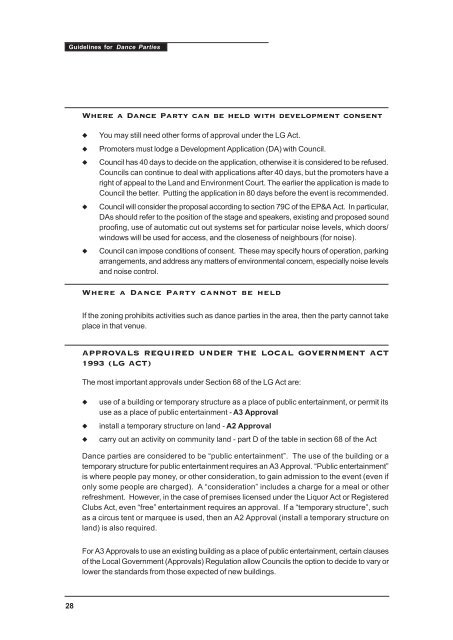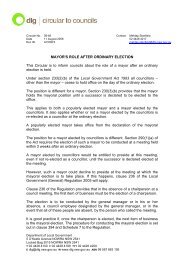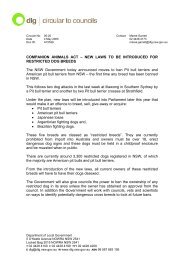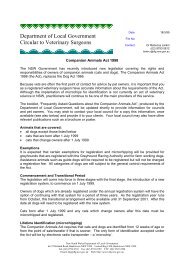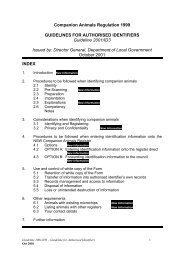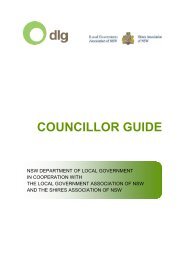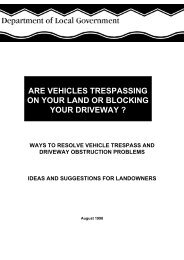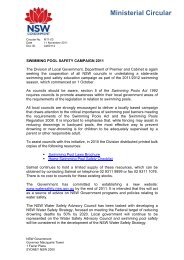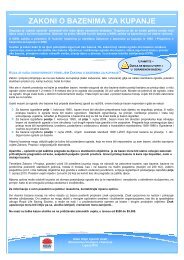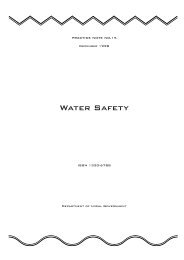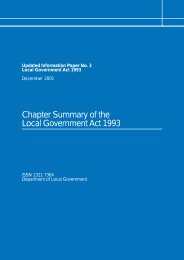Guidelines for Dance Parties - Division of Local Government - NSW ...
Guidelines for Dance Parties - Division of Local Government - NSW ...
Guidelines for Dance Parties - Division of Local Government - NSW ...
- No tags were found...
You also want an ePaper? Increase the reach of your titles
YUMPU automatically turns print PDFs into web optimized ePapers that Google loves.
<strong>Guidelines</strong> <strong>for</strong> <strong>Dance</strong> <strong>Parties</strong>Where a <strong>Dance</strong> Party can be held with development consent◆◆◆◆◆You may still need other <strong>for</strong>ms <strong>of</strong> approval under the LG Act.Promoters must lodge a Development Application (DA) with Council.Council has 40 days to decide on the application, otherwise it is considered to be refused.Councils can continue to deal with applications after 40 days, but the promoters have aright <strong>of</strong> appeal to the Land and Environment Court. The earlier the application is made toCouncil the better. Putting the application in 80 days be<strong>for</strong>e the event is recommended.Council will consider the proposal according to section 79C <strong>of</strong> the EP&A Act. In particular,DAs should refer to the position <strong>of</strong> the stage and speakers, existing and proposed soundpro<strong>of</strong>ing, use <strong>of</strong> automatic cut out systems set <strong>for</strong> particular noise levels, which doors/windows will be used <strong>for</strong> access, and the closeness <strong>of</strong> neighbours (<strong>for</strong> noise).Council can impose conditions <strong>of</strong> consent. These may specify hours <strong>of</strong> operation, parkingarrangements, and address any matters <strong>of</strong> environmental concern, especially noise levelsand noise control.Where a <strong>Dance</strong> Party cannot be heldIf the zoning prohibits activities such as dance parties in the area, then the party cannot takeplace in that venue.APPROVALS REQUIRED UNDER THE LOCAL GOVERNMENT ACT1993 (LG ACT)The most important approvals under Section 68 <strong>of</strong> the LG Act are:◆◆◆use <strong>of</strong> a building or temporary structure as a place <strong>of</strong> public entertainment, or permit itsuse as a place <strong>of</strong> public entertainment - A3 Approvalinstall a temporary structure on land - A2 Approvalcarry out an activity on community land - part D <strong>of</strong> the table in section 68 <strong>of</strong> the Act<strong>Dance</strong> parties are considered to be “public entertainment”. The use <strong>of</strong> the building or atemporary structure <strong>for</strong> public entertainment requires an A3 Approval. “Public entertainment”is where people pay money, or other consideration, to gain admission to the event (even ifonly some people are charged). A “consideration” includes a charge <strong>for</strong> a meal or otherrefreshment. However, in the case <strong>of</strong> premises licensed under the Liquor Act or RegisteredClubs Act, even “free” entertainment requires an approval. If a “temporary structure”, suchas a circus tent or marquee is used, then an A2 Approval (install a temporary structure onland) is also required.For A3 Approvals to use an existing building as a place <strong>of</strong> public entertainment, certain clauses<strong>of</strong> the <strong>Local</strong> <strong>Government</strong> (Approvals) Regulation allow Councils the option to decide to vary orlower the standards from those expected <strong>of</strong> new buildings.28


